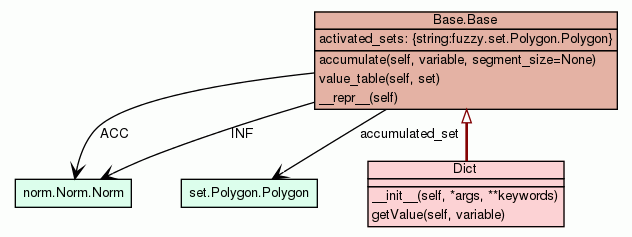Class Dict
source code

Not a real defuzzification. Just stores the adjective memberships in a
dictionary for output. You should use in the adjectives instances of Set
itself.
What can be done with this?
For example:
You want help with buying a car.
Input are your preferences:
speed, payload (1-10), ...
(map to "very important, important, doesn't matter, not wanted,
never" ;-)
Output are choices: cars with adjectives: ferrari, truck, ...
rules are as follows:
if speed->very_important && payload->never then car->ferrari
if payload->very_important then car->truck
... and so on
Then you use this as follows:
input variables
{ speed:3, payload:1, ...}
==>
output_variables
{ car: {
ferrari:0.1,
truck: 1.0,
...
}
}
|
|
__init__(self,
*args,
**keywords)
x.__init__(...) initializes x; see help(type(x)) for signature |
source code
|
|
|
|
|
|
Inherited from Base.Base:
__repr__,
accumulate,
value_table
Inherited from object:
__delattr__,
__format__,
__getattribute__,
__hash__,
__new__,
__reduce__,
__reduce_ex__,
__setattr__,
__sizeof__,
__str__,
__subclasshook__
|
|
Inherited from object:
__class__
|
__init__(self,
*args,
**keywords)
(Constructor)
| source code
|
x.__init__(...) initializes x; see help(type(x)) for signature
- Parameters:
INF - inference norm, used with set of adjective and given value for itACC - norm for accumulation of set of adjectives - Overrides:
object.__init__
- (inherited documentation)
|
